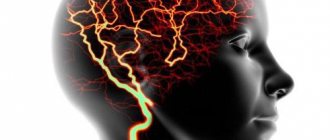Personality disorders
To fully understand the essence of the hysterical type, you need to start from the very beginning, namely, with the definition of the concept of “personality”. What it is? Personality is a pattern of behavior, thoughts and emotions, unique qualities that are inherent in a particular person. It is personality that is formed as a result of a long process of human development and socialization, and it is personality that helps build relationships with other people and determines human destiny. But sometimes personality is not formed correctly, and as a result, a person develops deeply ingrained and unhealthy ways of thinking that lead to deterioration in relationships with other people.
Recently, personality disorder had a completely different name. The causes of “constitutional psychopathy” were considered to be incurable neurological pathologies. However, personality disorders are so diverse that doctors have changed their point of view and came to the conclusion that the cause can be both a genetic predisposition and unfavorable conditions in childhood, as well as stressful situations. There are 10 disorders in total, but they are largely similar to each other:
- Cluster A includes eccentric disorders, including schizoid and paranoid.
- Cluster B includes dramatic and disordered disorders, including narcissistic and borderline personality disorder.
- Cluster C includes anxiety disorders such as obsessive-compulsive and addictive disorders.
The first signs of the disorder appear only in adolescence or adulthood. Many people know how a hysterical woman behaves, but not everyone knows that in some cases this is not a whim, but an illness. What is Histrionic Personality Disorder?
Treatment of hysterical personality disorder in Moscow
Treatment is not provided during the compensation period. Preventive measures are recommended for children and adolescents, which can be carried out by a child psychologist at an educational institution. These include psychological support, working with parents, and assistance in choosing a profession. This helps prevent decompensation of psychopathy.
Psychotherapeutic and drug treatment is prescribed for decompensated personality disorder. A psychotherapist works with a patient in a psychiatric hospital or outpatient setting. Various options for psychological assistance can be used: individual, family or group psychotherapy.
Medicines are prescribed for severe disorders. If a patient develops depression that is resistant to psychotherapy, antidepressants are used: Fluoxetine, Amitriptyline and others. They require regular use and lead to a significant effect after 3-4 months.
To eliminate hysterical reactions, antipsychotics such as Risperidone and its analogues can be used. Asthenia is an indication for the use of “mild” neurostimulants. Any medications are prescribed only by the attending physician. All psychotropic drugs have an extensive list of contraindications, non-compliance with which can cause serious complications.
Dr. Isaev’s clinic provides professional treatment for hysterical personality disorder in Moscow, and an individual course of therapy is drawn up for each patient. When compiling it, the patient’s age, signs of the clinical picture of the disease, and past treatment experience are taken into account. During consultations with a doctor, it is important not to hide any facts, even if they discredit the personality of the person contacted. The more accurately the diagnosis is made and the sooner correction begins, the better the result will be.
What is a hysterical personality type?
Hysterical disorder is also called dramatic or theatrical disorder, since patients with this problem tend to be overly dramatic, theatrical, and exaggerate their feelings. The behavior style of people with this personality disorder is far from normal: they want to be the center of attention in a group of other people and are willing to do anything to achieve what they want. Naturally, people with personality disorders are poorly socialized, they rarely have personal relationships, and all their friends and family eventually turn away from them due to inappropriate behavior. Often, patients with hysterical personality disorder repress problems and “escap” into illness, demonstrating real and imaginary symptoms.
Often such people can be very interesting and lively; they reach particular heights in narrow circles - for example, in a theatrical environment in which such behavior is acceptable. But in personal relationships and with emotional intimacy, they may experience difficulties. They often seek to manipulate their partners and play a certain role (for example, “victim” or “princess”). Also, people with hysterical types often display sexually seductive or provocative behavior to attract attention to themselves.
Hysterical character: features, strengths and weaknesses
The essence of the hysterical character is a pronounced abnormal ability to repress unpleasant facts. It is not difficult for a hysteric to “drive” certain events into the depths of consciousness at the required moment for a long time. He can completely “forget” phenomena that he does not want to know. He is capable of outright lying without realizing that he is telling a lie. At the same time, at the right moment, the hysteric extracts the necessary knowledge from the depths of the subconscious. The hysterical character is also described in the literature under other names: demonstrative type, theatrical personality. The core of the “pure” hysterical character
The core of a hysterical character is a combination of the following components:
- extreme degree of selfishness and individualism;
- obsessive desire to be the center of attention;
- perfect repression mechanisms;
- painful infantilism.
- The individual performs drastic, unpredictable and unexpected actions for others. For example: he suddenly stumbles out of the blue and a glass of champagne “accidentally” slips out of his hands.
- The subject deliberately “breaks” behavior patterns. For example: they extend their hand to him to shake hands, and he demonstratively begins to look for something in his bag.
- A hysterical personality strives to “fill” the entire living space with itself. For example: a person constantly talks, does not allow interlocutors to get a word in, without stopping, comments on events.
- To attract attention, a subject with a hysterical character may make meaningless jokes, be sarcastic, and rudely criticize others. For example: a person begins to deliberately pester a person who remains indifferent to him.
- The hysteric loves to be in “contrast.” For example: he may wear ridiculously eccentric clothes to stand out from the crowd. Or the hysterical person will start a friendly relationship with the “little little mouse” in order to appear in a favorable light against her background.
- A characteristic feature of a demonstrative type of personality is to force the people around them to sympathize. For example: he makes endless complaints about the heavy blows of fate, while emphasizing how heroically he endures all hardships and trials.
- The favorite technique of hysterics is “flight” into illness. For example: a person with a hysterical character invents non-existent incurable diseases for herself, demanding care from loved ones.
- A trick that demonstrative types often resort to is behavior that goes beyond the boundaries of understanding. For example: a student may start saying nasty things to the teacher during a lecture.
- To attract attention, a hysterical person is ready to perform a feat. In this case, a person will demonstrate heroism only in the presence of spectators. For example: the demonstrative type will be the first to rush to destroy a fire if there are witnesses nearby, and will stand aside if there is no one nearby.
Component 1 The foundation of the hysterical character is an extreme form of pathological egoism - egocentrism. The hysteric is convinced that the world revolves around him. He is consciously unwilling and unable to consider and perceive opinions different from his own views. He considers his point of view to be the only correct option that exists. He sincerely does not understand that other people may have different preferences, wishes, and goals. All emotions, feelings, experiences of a subject with a hysterical character are concentrated around his own personality. He is concerned only with satisfying his personal needs. It can be argued that such an individual perceives all phenomena of reality exclusively through the prism of his own “I”. Component 2 Of all the characteristic features of a hysteric, what comes to the fore is a strong, irresistible, uncontrollable desire to attract attention to oneself by any means and means. A subject with a hysterical character experiences an irresistible need to be the central figure in the human community. To attract the attention of the public, the hysteric is not picky about the means. The main weapon of a hysterical nature is demonstrative behavior, a phenomenal ability to put one’s persona in the foreground, turning those around them into involuntary spectators. The main goal of the theatricality of a hysteric is to appear before the public in an advantageous light, to seem like a more outstanding personality that a person is, to externally demonstrate traits and abilities that are simply absent. A subject with a hysterical character strives for originality, shows non-existent superiority, and passionately craves recognition from society. Such a personality is characterized by exaggeration of experiences and theatrical panache in behavior. The inherent properties of a hysteric: deceit, deliberate exaggeration, posturing - actions aimed at a striking effect. The main variations of demonstrative behavior that a hysteric uses to attract the views of others to his person are the methods listed below.
The list of hysterical methods can be continued indefinitely, but all the tricks of a demonstrative personality are united by one feature - bright variations of pose. In any situation, the insincerity, falsity, artificiality of the behavior of a person with a hysterical character is striking. Even an inexperienced observer becomes convinced that the words and actions of a hysteric are devoid of sincere warmth. Component 3 A significant element in the structure of a hysterical character is a repression mechanism honed to perfection. It is the ability of the demonstrative type to expel information from consciousness that allows one to ignore obvious facts, not think about interfering obstacles, and refute the arguments of common sense. The hysteric lacks a strong inner core and has a high level of mobility of mental processes. The combination of such properties with the phenomenal ability to imagine makes it possible not to notice the differences between truth and lies, not to feel the line between fantasy and reality. The ability to repress in hysterical individuals can reach pathological proportions when the individual begins to “control” the sphere of the psyche. He begins to see the pictures that he wants to observe in the environment. A hysteric person can completely “forget” those events that he does not want to know about. He is capable of blatantly lying in the confidence that he is telling the pure truth. For such a subject, a blatant lie is transformed into an undeniable truth. His unconscious lies are never accompanied by remorse. Such a person is not afraid of possible exposure. A person with a hysterical character is able to unconsciously control his gestures and facial expressions. The hysterical person's face will never show signs of confusion, he will not blush with shame, and will behave relaxed and confident. An adventurous personality fully gets used to the role that he has planned to play and is never lost when circumstances change. At the same time, the hysteric wears an invented mask as long as it is beneficial to him: he sheds the false mask when he achieves his goal. Component 4 An irreplaceable link in the ensemble of a hysterical character is an inharmonious combination of the qualities of a mature person and the properties inherent in childhood. The hysteric clearly displays infantilism - painful childishness, manifested in egocentrism and demonstrative behavior. Such a subject often lives for today, without thinking about his own future. He is able to enjoy the present moment, rewarding impressions with bright colors. His feelings are fickle and superficial. The hysteric violently demonstrates his frequently changing emotions. His unstable mood is reflected in all his statements and actions. He is not able to objectively evaluate the facts of reality. He does not know how to restrain his own desires, trying to satisfy immediate needs. Along with the traits characteristic of childhood, a person of the demonstrative type has developed purely adult qualities: prudence, the ability to adapt, the ability to lie shamelessly. The hysteric is distinguished by his special sexuality and charisma: he is able to win people over and achieve recognition. Their courtesy and helpfulness at the right moments makes it possible to occupy a high position, although such a person cannot be proud of his special diligence. Interaction in society
All relationships with society of a hysteric are built on his ability to manipulate. A person with a hysterical character can be a sweet good boy, a demanding boss, or a helpful colleague. He always appears before the right people in plausible roles, although he can purposefully bully the people dependent on him. Persons with a hysterical character are clever swindlers and adventurers. The demonstrative type very cleverly plays by the rules of the Dynamo game. Such a subject is capable of seducing anyone, and when his victim responds to coquetry, he begins to show angry contempt. Having achieved the desired goal, he says goodbye to no longer needed people with cold efficiency. A negative trait of a hysterical character is the inability to keep promises. Such a subject can promise mountains of gold, while he will not have a penny in his pocket. Single women who have trusted a skilled marriage swindler often fall for the bait of hysterics. He very cleverly courtes the chosen victim, and after a while, having received the reward, completely disappears from sight. At the same time, an abandoned woman often considers herself to blame for the breakup, not realizing that she was skillfully manipulated. An individual with a hysterical character copes well with the responsibilities of sellers, advertisers, and agitators. His ability to pretend, without feeling an internal contradiction, allows him to “feel” the characteristics of the buyer or customer, easily eliminate existing obstacles and “hand over” to the client, stunned by the sincerity of the merchant, an absolutely unnecessary product. The hysteric reveals his “gift” in politics. He is effective because he is able to completely renounce his worldview and act as circumstances require. He knows how to “hang noodles” on the ears of voters, instill the attitudes he needs and achieve unconditional recognition of the electorate. A person with a hysterical character unwittingly becomes a central figure in society. He may become a famous actor or singer, famous TV presenter or journalist not because he has natural talent and exceptional knowledge, but because he is driven by an unconscious need for recognition. In his life interests and hobbies, a demonstrative personality is a changeable and indiscriminate nature. His tastes and hobbies often depend on fashion trends. He rarely possesses genuine deep knowledge: most often he receives superficial erudition from various spheres of life. The thinking and behavior of a hysteric is contradictory; his life wisdom is mixed with childish stupidity. Moreover, such illogicality and inconsistency of actions arises not because of the presence of mental defects, but because of emotional lability. With a hysteric, you need to be prepared for a rapid turn of events: it is useless to be surprised and indignant at the inconstancy of this subject. Constant mood swings are often a serious obstacle to creating harmonious relationships in the family. The mood of a hysteric literally depends on “what foot he got up from.” Moreover, his cheerfulness and carefreeness can quickly give way to apathy or aggressiveness. When communicating with a person of a demonstrative type, one often gets the impression that he alone is impeccable, and other people are worthless creatures. He does not notice his own flaws, but he finds a lot of shortcomings in others. This trait is based on infantilism: when a person is not able to adequately beat an opponent, he begins to look for non-existent deformities in him in order to appear in a more advantageous light. To calm down a hysteria, you often have to resort to flattery: such a subject really loves to receive compliments addressed to him. Having received the required portion of admiration, the demonstrative subject temporarily stops his machinations and becomes capable of adequate relationships. It should be noted that it is useless to be angry with this person: the hysteric will not admit his guilt, but will find arguments to accuse his interlocutor. Assuming that you are dealing with a hysterical person, you need to be careful. To avoid becoming a victim of manipulation, you should firmly adhere to your point of view and not believe the tricks of a liar. When the hysteric sees that his tricks are not working, he changes tactics and calms down. In this state, it is possible to build a normal and full-fledged relationship with the subject. However, the demonstrative nature demands confession over time, and the subject begins to look for new victims.
It should be noted that hysterical character traits are observed in different proportions. One hysteric requires special recognition, another is characterized by extreme egocentrism, the third demonstrates childishness and seeks protection from others. If the hysterical component does not have a pathological accentuation, it is quite possible, by working on oneself, to get rid of destructive personality traits.
Causes of the disorder
The hysterical personality type manifests itself in the same way in men and women. However, researchers have not yet determined what exactly causes it. Most professionals believe that the causes are related to various biological, social and genetic factors:
- Heredity and chronic diseases, including mental ones.
- Early childhood interactions with family and others.
- Level of stress in childhood and ability to cope with it.
- Personal temperament.
- Traumatic events.
No single factor can become the sole cause of the development of a hysterical state. Most likely, this disorder occurs due to a combination of several conditions.
Preventive actions
Prevention of the disease should take place in early childhood and adolescence. It is non-specific:
- the family should have a friendly and supportive psychological atmosphere;
- parents explain to the child how to interact correctly with people around him and perceive his own personality;
- when moving, transferring to another educational institution and situations accompanied by stress, a child psychologist works with the child;
- assistance in determining a future profession.
If a person is diagnosed with hysterical personality disorder, then prevention is aimed at preventing his transition to the stage of decompensation. This requires eliminating any stressful situations, taking drugs and alcohol, and also ensuring positive relationships with loved ones.
Increasing desire to be noticed
A personality disorder is an enduring pattern of internal experience and behavior that differs from the norms and culture of others. This, as a rule, leads to significant problems in all areas of a person’s life: work, personal, etc. The pattern of behavior is quite stable and can be traced throughout life.
Onset usually occurs in adolescence or adulthood. A close relationship with a patient can become a real hell for the other person. A person with a hysterical personality type requires constant attention to himself, but cannot do routine things and wants to get immediate results in all areas of life. As a result, he constantly manipulates, gets offended, quarrels and emotionally affects his partner or loved ones in any way possible. But there is no need to assume that he himself enjoys it - he simply cannot live any other way.
Hysterical attacks are frequent accompaniments of personality disorder. They allow you not only to attract attention, but also to throw out accumulated tension.
Symptoms
It is quite difficult for a non-specialist to distinguish pathological deviations from character traits or temperament. In order to suspect mental abnormalities, close contact and psychological education are needed. Since in most cases people with personality disorders do not have close, trusting relationships, they rarely receive help from professionals. In the meantime, the sooner the cause of a person’s strange behavior is determined, the more help can be provided to him.
Here are the main symptoms of a personality disorder that may indicate pathological changes:
- The patient dresses provocatively and behaves deliberately sexually. Sometimes this can interfere not only with love relationships, but also with friendships, since a person can address deliberate sexuality to everyone indiscriminately.
- People with histrionic disorder tend to spend an excessive amount of time focusing on their appearance. Sometimes they have a completely unrealistic and detached image of themselves, as a result of which, for example, they may constantly undergo plastic surgery or dress strangely, thus deliberately attracting attention to themselves.
- A person has a desire to be the main object of attention. Such people want there to be no other interesting personalities in the lives of other people besides them. They know that if they get attention, they can get what they want.
- These people are easily influenced. When dealing with a personality disorder, this factor can become a significant problem. Any person who appears in the patient’s field of attention can have an impact on him, and it is not always positive.
- They feel discomfort when there is insufficient attention.
- They exhibit impulsiveness, commit spontaneous actions that cannot always be logically justified, exhibit emotional instability, and throw tantrums for no reason.
- The behavior of such a person is often unnatural, his voice is loud, and his movements are abrupt.
- There is causeless aggression. Aggression in psychology is something that contradicts generally accepted norms.
Personality disorders can vary in severity, so the intensity of symptoms can also vary.
Diagnostics
Personality disorders should only be diagnosed by a qualified mental health professional. This can be either a psychologist or a psychiatrist. Therapists and general practitioners, as a rule, do not have sufficient knowledge to distinguish a normal hysterical attack from a mental illness. If you want to get free help, you can first contact your general practitioner and then get a referral from him to see a specialist. There are currently no genetic or laboratory tests that can be used to diagnose the disease.
Many people with mental disorders do not seek treatment on their own and avoid it at all costs. Only when changes in the psyche begin to seriously interfere with a person’s life can he consult a doctor. But often by this time the patient’s resources are already so depleted that he cannot cope with stress and life’s troubles on his own.
The diagnosis of a mental disorder is made by a specialist after he has studied the medical history and compared the symptoms with the classic picture of the disease. There are also special tests that determine the presence of hysterical personality disorder in children and adults. They allow you to clarify the situation a little and more accurately establish a diagnosis. But mental tests cannot be the sole or primary basis for diagnosis.
Medications
Treatment for personality disorder usually includes comprehensive measures that are aimed at eliminating symptoms and normalizing the patient’s condition and well-being. The main method is psychotherapy, which can take many years. But in addition to this, medications can also be prescribed, which usually serve to eliminate the symptoms of histrionic personality disorder. Prescriptions are made personally for each patient, depending on the picture of his disease. For example, people suffering from insomnia may be prescribed sleeping pills. For some patients, doctors prescribe sedatives and tranquilizers that help reduce anxiety.
Hysterical behavior cannot be cured with drugs alone. Work to eliminate the disorder can take many years, and the success of treatment depends mainly on the qualifications of the specialist and the motivation of the patient. Doctors rarely disclose drug treatment regimens, since in some cases they can be used for self-destructive and harmful effects on the body by patients.
External manifestations
Individuals prone to hysterical psychopathy from a very early age differ significantly from other children. They do not strive to communicate with peers, preferring to spend all their free time next to their parents and seek their attention and affection by all available means. It will be normal for them to organize a home concert with songs, dances or poetry readings.
By this behavior they prove to themselves and others that they are unique and worthy of universal recognition and praise. Parents, naturally, begin to be touched, considering their child gifted, although in fact there is no question of any giftedness in this case. The result of creativity is not important to them; their goal is only the admiration of others.
It is almost impossible to force such a child, especially when he is at puberty, without receiving admiration at school, he quickly burns out and loses interest in learning.
Adolescence in a hysterical personality can confidently be called the peak development of the syndrome. It is during this period that teenagers try to attract the attention of others through demonstrative suicide attempts. It is normal for them to climb to the roof of the school, blame their ex-lover for dashed hopes and a broken heart, and then threaten to jump down. Some teenagers generally cease to feel the difference between real life and playing in public, which can lead to disastrous consequences.
Also, children suffering from hysterical personality disorder tend to run away from home, and even preparations for leaving the family nest will smack of theatricality. A child may resort to such actions if he does not receive the attention and admiration required from his parents. Among other things, they do not have a constant circle of friends, because trying to take a leading position in the hierarchy of the group, they quickly become disappointed and quickly leave for another company.
For adults, the following symptoms of hysterical personality disorder are typical:
- demonstrative behavior, the form of which depends on the specific situation and the status of others;
- extravagance and focusing on one’s own sexuality in clothing style and behavior;
- a tendency to embellish events and the desire to tell truly fabulous stories about oneself;
- maintaining superficial contacts with friends and colleagues that do not last very long;
- inability to soberly assess the surrounding reality and infantilism;
- demonstrative grievances against criticism, insults and pronounced protest;
- tendency to suggest;
- changeability in attitude towards other people: the former idol can suddenly lose all authority in the eyes of the hysteric.
It is quite easy to notice manifestations of hysterical disorder in a child. For example, he did not receive the desired approval, then he will simply fall to the floor under the influence of an attack of tonic convulsions, expressed in bending of the body with support on the crown and heels - a hysterical arc.
In an adult, hysterical syndrome can cause diseases of a neurogenic nature - a hysterical lump. It is manifested by a continuous sensation of the presence of a foreign object in the area of the thyroid cartilage. Most often, women prone to hysterical attacks and depression become victims of this symptom.
If a patient with hysterical syndrome is exposed to severe stress associated with violence and humiliation, then, against the background of mental trauma, he may develop hysterical amnesia. In this case, there is a protective reaction of the body to a traumatic event, which is manifested by the repression of negative memories.
Important
If a woman at a young age was repeatedly able to overcome problems in interpersonal relationships with the help of demonstrative behavior, then the likelihood of her developing a hysterical disorder is very high.
Psychotherapy
The hysterical personality type in psychology is distinguished by egocentrism and self-obsession. This is where the lack of empathy and inability to empathize with another person comes from. Such people are often aggressive not only towards others, but also towards themselves. Aggression in psychology is destructive behavior that contradicts generally accepted norms and causes physical or moral harm to people. In fact, the behavior of people with a hysterical type of disorder constitutes aggression. It is rarely expressed directly, but it is always felt by people who have entered into close communication with patients. The behavior style of such people causes bewilderment and rejection among others. Psychotherapy is considered the main method for treating personality disorders.
People suffering from this disorder are usually difficult to treat. They come to the doctor only as a last resort - when life literally leaves them no other choice. Treatment can be based on a short-term approach, which does not aim at long-term changes, but at immediate relief from the patient's life difficulties. This is due to the fact that people with mental personality disorder rarely have the ability to expect a delayed effect from therapy and simply stop it if there is no significant result.
Self help
Self-help for a disorder does not bring any results. There are also no anonymous groups that support people with similar problems. Even if you find such a community, it is unlikely that such sessions will be sufficiently effective due to the nature of the disease. Because people with histrionic personality disorder are overly dramatic, everyone in group meetings will try to draw attention to themselves, without paying attention to others. Therefore, the most optimal form of treatment is personal consultation with a psychotherapist. Experts also recommend refusing family consultations, since in this case communication will not be constructive.
Complications
These symptoms often lead to a person developing a tendency toward self-deception, which can reach an exaggerated degree. As a result, the patient always considers himself to be right, even if he commits antisocial acts or crimes. Hysterical personality disorder is typical for thieves, swindlers, rapists and other criminals.
Without treatment, hysterical psychopathy in women can lead to frigidity. At the same time, the patient arranges sexual provocations, flirts and shows sympathy for men. However, lasting relationships between them are not formed. Against the background of hysterical disorder, autonomic disorders are possible. These include nausea, increased body temperature, asthma attacks, movement disorders and other signs.
The main reason for their appearance is psychosomatics, which occurs as a reaction of the nervous system to severe psychological disorders. People with a hysterical personality are prone to a promiscuous sex life and abuse of alcohol and drugs. They are at increased risk of developing psychosis and depression, as well as other mood disorders.
Features of the disorder
Hysteria is a rather dangerous mental illness, which is often characterized by suicidal tendencies. The hysterical personality type in women manifests itself in the form of overly expressed sexuality, in some cases – nymphomania, theatricality and attempts to attract attention to one’s person. The same is observed in male patients.
In children, the hysterical personality type is not diagnosed, since this disease manifests itself only at the end of adolescence or in adulthood. A child is an unformed personality, so it is incorrect to talk about disorders of something that is only improving and changing. Children are prone to hysterics and some behavioral deviations, and these problems should certainly be corrected by a specialist psychologist, but they have nothing to do with the hysterical type of disorder.
Main features
The behavior of persons with hysterical psychopathy easily changes depending on the situation and current environment. In one situation, the hysterical behaves emphatically modestly, strives to evoke increased sympathy for himself, and in another, he surprises the audience with his swagger.
Such people try to attract attention in all possible ways: stories, facial expressions, clothes, actions. They willingly attribute to themselves qualities and virtues that are unusual for them, quite often simply inventing them. They can also attract attention to themselves through loud sobs, fainting, and suicidal demonstrations.
They are sociable and easily make friends. Only communication continues as long as all attention is focused on their personality; as soon as interest in them is lost, they look for new interlocutors.
Hysterical psychopaths are impressionable, emotional, and suggestible. Their logic is completely based on emotions, vivid but superficial.
Difficulties in building interpersonal relationships in people suffering from hysterical personality disorder are associated with their pronounced egocentrism. On this basis, various conflicts may arise in the family and at work.
The hysteria, even in adulthood, will resemble a child in its behavior. You can spend time with him in an interesting way; with his behavior he can entertain others and will stand out among other people. However, such people are not capable of building deep interpersonal relationships. You should not count on their support in difficult life situations. And it is unlikely that it will be possible to agree on compromise terms with such a person.
Hysterical psychopathy can develop into the development of hysterical neurosis, the symptoms of which I described in a separate article.
Data
If one of your loved ones has been diagnosed with a hysterical personality type, then it will be useful for you to know some facts about this disease:
- Psychotherapy, medications, and alternative treatments together can be therapeutic and significantly reduce the distressing symptoms of the disorder. But treatment for this must be regular and long-term, only in this case it will bring the desired result.
- Different types of disorders can manifest themselves differently in society. For example, some patients may hold relatively high positions at work, but at the same time fail in their personal relationships.
- These disorders are more common in women than in men.
- Histrionic personality type is a disorder in which a person exhibits excessive emotions, seeks attention, behaves provocatively, and constantly gets involved in conflicts in personal relationships.
- Events that occur in childhood (death, parental divorce, violence) can lead to a personality disorder.
- People with the problems described tend to exaggerate the good attitude of others towards them and attribute greater importance to friendships than they really are.
Results
Hysterical personality disorder is a very painful mental illness that causes many problems not only for others, but also for the patient himself. It is characterized by a high level of anxiety, numerous conflicts and contradictions. Such people tend to deliberately look for dangerous situations and get involved in various adventures.
Not all of them can suspect the presence of the disease, so they often do not resort to treatment. However, an experienced specialist, through personal examination, conversation and mental tests, can quickly make a diagnosis and prescribe treatment. The only effective method at the moment is psychotherapy, which can take a lot of time. But with its help, the patient will be able to get rid of painful symptoms and after a while feel much better.











